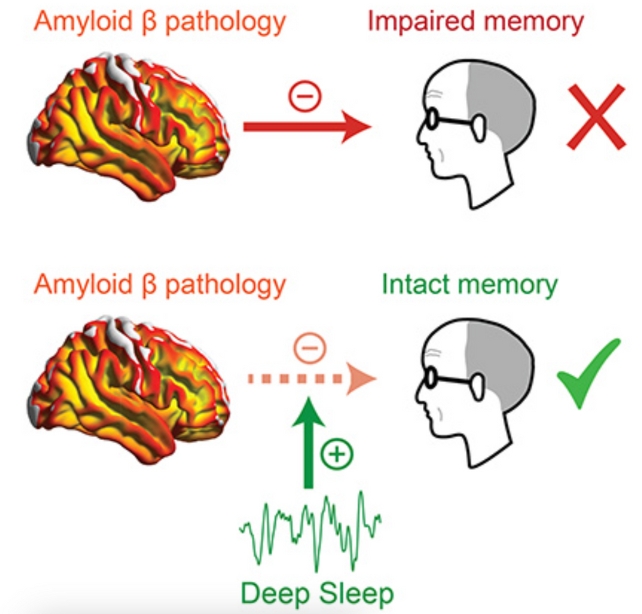
Getting quality deep sleep may be crucial in delaying gradual declines in brain health that could eventually lead to Alzheimer’s, the most prevalent form of dementia.
In a recent study conducted in 2023, researchers from the University of California (UC) Berkeley, Stanford University, and UC Irvine examined 62 older adults with healthy cognitive function. They found that those exhibiting brain changes related to Alzheimer’s performed better on memory assessments the more deep sleep they obtained.
This connection remained consistent regardless of the participants’ educational background or physical activity levels, both of which are known contributors to cognitive resilience in older adults.
In contrast, individuals with similar Alzheimer’s-related changes who experienced insufficient deep sleep did not perform as well on memory tests. However, sleep quality had little impact on those with minimal amyloid deposits.
The findings, which were published in May 2023, suggest that getting ample restful sleep can help combat the memory decline that often accompanies the onset of dementia.
“Think of deep sleep as a lifeboat that keeps memory afloat, rather than letting Alzheimer’s pathology weigh it down,” explained Matthew Walker, a neuroscientist at UC Berkeley.
“This is particularly exciting because it’s something we can address. There are effective strategies to enhance sleep quality, even for older individuals.”

This research aligns with earlier studies that have identified a correlation between disrupted sleep and the accumulation of amyloid-beta proteins in the brains of individuals with sleep disturbances.
However, inadequate sleep is both a potential risk factor and a symptom of Alzheimer’s, complicating efforts to determine cause and effect. Similarly, the clustering of amyloid-beta proteins may merely indicate the presence of the disease rather than being its underlying cause.
Nevertheless, amyloid-beta levels are often used as indicators of Alzheimer’s disease, as studies suggest they, along with tau proteins, can start building up in the brain years before any symptoms manifest.
Previous work by Walker’s team found that significant amyloid-beta aggregation in older adults can disrupt deep sleep—also referred to as non-rapid eye movement (NREM) slow-wave sleep—and negatively affect memory function.
Interestingly, some individuals appear to resist the cognitive decline associated with Alzheimer’s disease despite having elevated amyloid-beta levels. To explore this further, Walker and his colleagues monitored the brainwaves of participants during sleep and subsequently assessed their memory capabilities.
Among those with comparable amyloid-beta deposits, achieving quality deep sleep seemed to play a crucial role in maintaining cognitive function.
This beneficial effect was particularly noted in the non-rapid eye movement slow-wave sleep phase, whereas other sleep stages and frequencies showed less correlation.

Further long-term studies involving older adults are necessary to determine whether enhancing deep sleep over time can effectively safeguard cognitive abilities despite rising amyloid-beta levels.
This research adds to a growing body of evidence suggesting that sleep may be a modifiable risk factor for Alzheimer’s disease, potentially allowing for the postponement of molecular changes by granting the brain necessary time to eliminate waste from daily activities. Additionally, it underscores the importance of sleep quality.
“With some degree of brain pathology, cognitive symptoms or memory difficulties are not inevitable,” said the study’s lead author, Zsófia Zavecz from UC Berkeley, in 2023.
Although some people may display biological markers indicating a trend towards Alzheimer’s disease, Zavecz emphasized that their study indicates lifestyle elements can help mitigate those impacts. “One such factor is sleep, particularly deep sleep,” she added.
While the study’s sample size was modest, it highlights the potential benefits of prioritizing natural sleep over relying on medication for rest.
Research indicates that users of sleep aids tend to have lower amyloid protein levels in their cerebrospinal fluid, which helps cleanse the brain overnight. However, these medications often carry side effects and may promote lighter sleep instead of the deeper restorative phases.
For those looking to enhance their sleep quality, Zavecz recommends avoiding caffeine later in the day, incorporating regular exercise, minimizing screen time, and taking a warm shower before bed.
As research advances, scientists are dedicated to unraveling the complexities of Alzheimer’s disease, which affects millions globally.
This study has been published in BMC Medicine.
A version of this article was originally published in May 2023.









